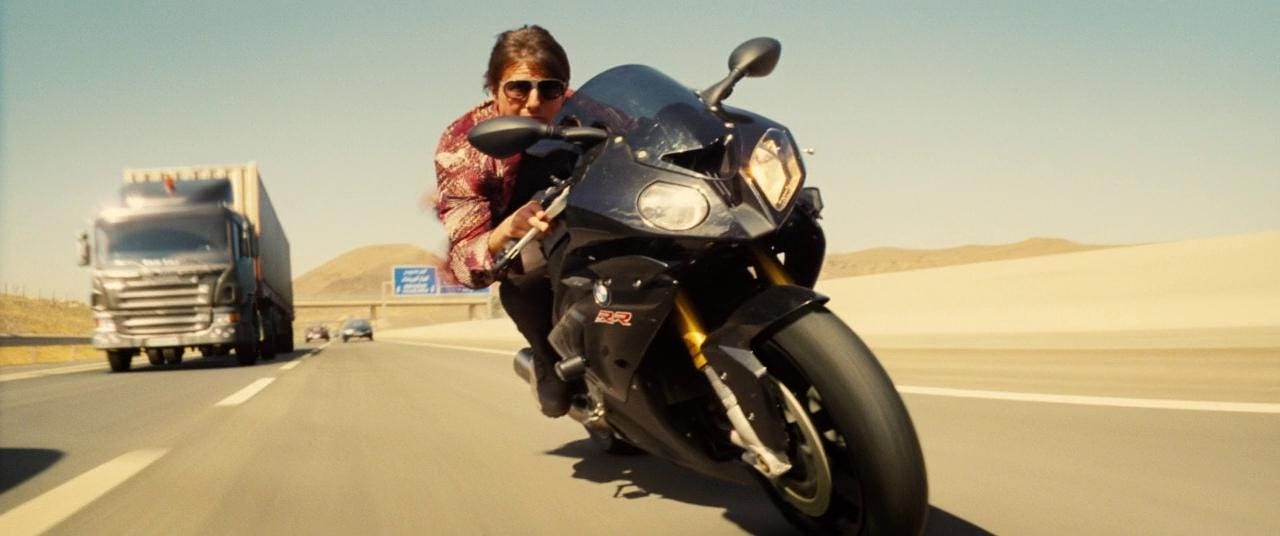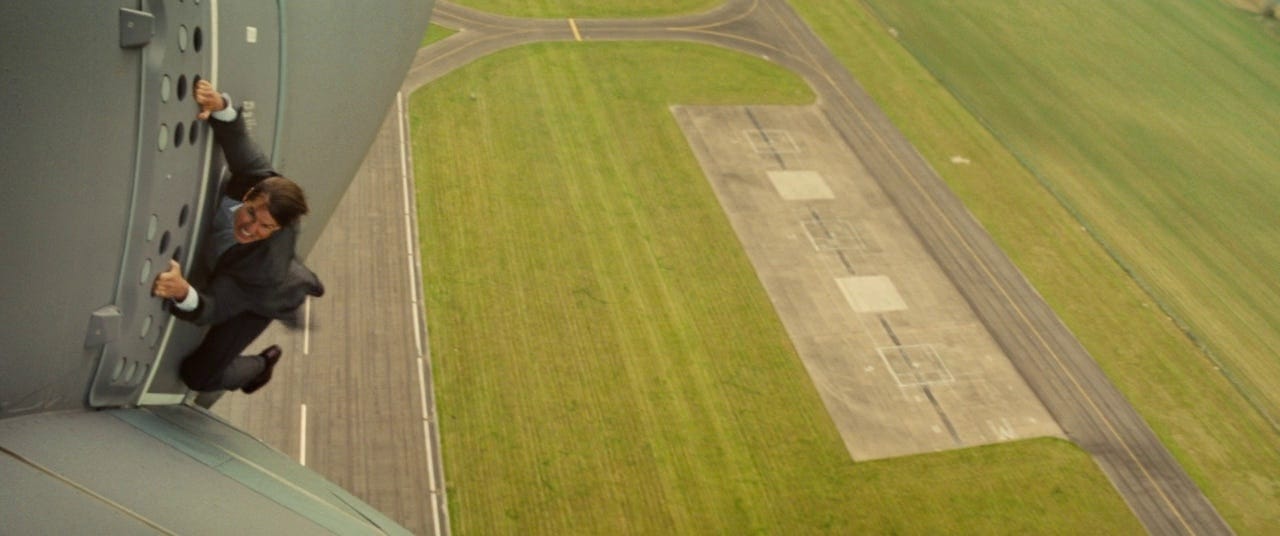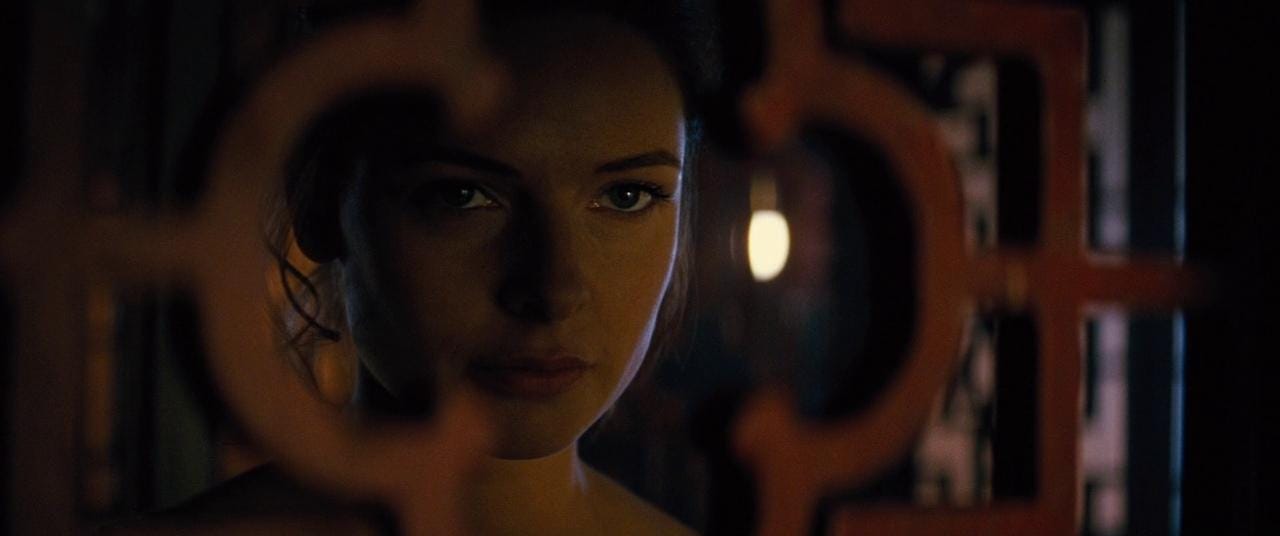Review: "MISSION: IMPOSSIBLE - ROGUE NATION" kicks off a series renaissance
Christopher McQuarrie and Rebecca Ferguson arrive to work magic
“Hunt is uniquely trained and highly motivated – a specialist without equal – immune to any countermeasures. There is no secret he cannot extract, no security he cannot breach, no person he cannot become. He has most likely anticipated this very conversation and is waiting to strike in whatever direction we move. Sir, Hunt is the living manifestation of destiny – and he has made you his mission.”
Mission: Impossible - Rogue Nation is a film so goddamn good that it begins with the absolutely killer image of Tom Cruise hanging off the side of a freighter plane as it lifts off the runway, and it’s not even one of the first ten things that come to mind when I think about how much I love this movie.
Rogue Nation is easily one of the most confident, inventive, expertly made popcorn films to come out of Hollywood in the 2010s. To me, this is the moment Mission: Impossible fully clicks into place as a franchise, the only fifth-installment-in-a-series I know of where it not only feels like there’s plenty of energy left in the tank, but boldly announces that we’ve only started scratching the surface of what these films can do. Christopher McQuarrie and Tom Cruise had been circling each other for a while: McQuarrie co-wrote 2008’s Valkyrie, which Cruise starred in, did uncredited rewrites on Ghost Protocol, and then wrote and directed 2012’s Jack Reacher, an underrated gem of an action movie that any fan of these later Mission: Impossible movies should see (yes, Cruise is a foot shorter than Reacher is supposed to be; no, I don’t care). There was already a lot of trust and experience in that creative relationship by the time we got to Rogue Nation,and it results in a magnificent Mission: Impossible film combining a little bit of everything that made the series work up until now, in particular marrying the slow-burn espionage elements of the Brian De Palma original with the character- and team-driven dynamics of Brad Bird’s Ghost Protocol. You even get a giant motorcycle chase a la John Woo’s Mission: Impossible II, complete with Cruise’s hair flapping in the wind as he leans so low to the bike he practically merges with the vehicle. What’s not to love?
The premise for this one – Ethan hunts down an ‘anti-IMF’ comprised of presumed-dead spies from all over the world – is immediately enticing, and while it should be a problem that this is the second movie in a row where the IMF has been shut down, and the fourth of five Mission: Impossible movies where Ethan is out on his own being hunted by his own country (it is hilarious to me that the weird John Woo movie is in fact the only Mission: Impossible where Ethan is officially ‘on mission’ the entire time), I think Rogue Nation is actually pretty savvy in recognizing – and embracing – that the series is at its best when Ethan’s only support system is the one he’s built for himself. Mission: Impossible isn’t James Bond, a series about a state-sanctioned patriot whose masculinity acts as a stand-in for, and extension of, the paternalism of the state; it is instead about a hero whose moral values and interpersonal loyalties are consistently prioritized above politics or national allegiance. Ethan is opposed to the ‘Rogue Nation’ of the Syndicate not because it threatens the hegemony of his home country, but because it threatens lives and causes chaos globally, and he will fight that threat with or without America’s support. This is a dynamic we’ve seen in the series before, and McQuarrie and Cruise won’t fully elevate it to the level of overt theme until the next entry, Fallout, but it’s absolutely a core part of the series, and something Rogue Nation is very much aware of, particularly in how it positions Ethan vis-à-vis the film’s other central character.
Because as important as the introduction of Christopher McQuarrie is to this series, the debut of Rebecca Ferguson’s wonderfully named Ilsa Faust is just as crucial to the series’ second-half renaissance. She’s the best character the franchise has introduced since Simon Pegg’s Benji, and in Rogue Nation specifically, she is the engine the entire film runs on: an alternate version of Ethan Hunt, every bit as sharp, competent, and cool, and also just as willing to take ludicrous risks with resolute confidence (look at how she ultimately foils Ethan during the second-act motorcycle chase, by standing firm in the middle of the road and banking on Ethan’s refusal to harm her). The unique fun of Rogue Nation comes in the way Ilsa is experiencing her own Mission: Impossible movie parallel and sometimes perpendicular to this one. She and Ethan clearly like and respect each other from the start, and Ethan’s always confident that her motives ultimately align with his desire to stop the Syndicate, but their individual missions don’t fully align until the very end, at which point they start kicking ass together like a well-oiled machine. Just as Hayley Atwell’s Grace would give Dead Reckoning its own arc, shape, and energy, Ferguson’s presence totally gives Rogue Nation a life of its own.
Moreover, the film is careful to make clear that she needs Ethan’s help not because she is any less skilled, but because the deck has been stacked against her so heavily, and because she doesn’t yet have the kind of support structure around her that Ethan has developed. As always, the ultimate superpower Ethan has to offer is loyalty and trust, not 007-style machismo. Ilsa is understandably tempted to walk away from this life entirely, after being so abused by both the Syndicate and her own government, and the real gift Ethan gives her is his own experience finding a way to use his skills for good even without the backing of nations or institutions. When Ethan declares victory against Solomon Lane with his “Meet to the IMF” kiss-off line, it’s not a jingoistic declaration of statecraft winning out over rogue terrorist actors, but a statement of pride in the way Ethan’s small ‘found family’ of misfit, thrown-away spies has triumphed over Lane’s own outsider organization. And it’s a family Ilsa has a place in now, as long as she wants it.
McQuarrie’s direction is, of course, superlative. While the film has no single stunt as attention-grabbing as the Burj Khalifa climb from Ghost Protocol, the film is packed start-to-finish with the exact kind of confident cinematic showmanship Cruise lives by. Case in point: The outstanding espionage sequence at the Vienna Opera, a fifteen-minute masterclass in cinematic intrigue and tension scored entirely to Puccini’s Turandot, which is one of the most perfectly, creatively crafted stretches of cinematic synesthesia I’ve ever seen in an action film. I am always in awe of the sheer number of moving parts here – literally, in the case of Ethan’s struggle on the rising and lowering scaffolding, or the wonderfully cartoonish image of a sniper rifle getting built out of a flute – and how effortless the entire sequence feels in how it maps all these connections across the opera house’s complex geography. What separates this scene from some of the other equally virtuosic set pieces in the series – like the Langley heist in the original or the train climax in Dead Reckoning – is how in-the-dark both the audience and Ethan are throughout it. Hunt starts the scene aiming to identify Solomon Lane in the crowd, but multiple wild cards emerge in the form of the Austrian Chancellor, Ilsa Faust, and two other assassins, throwing Ethan’s goal into chaos and forcing him to improvise.
It’s absolutely electric. And the film just builds from there, with a brilliant, outrageously tense underwater sequence that, in a preview of things to come in McQuarrie’s future installments, spirals out into a car chase, a spectacular car crash, a mountainside motorcycle chase, and a spectacular motorcycle crash, all with Ethan totally delirious having just nearly drowned to death. From this point forward, McQuarrie and Cruise more or less refuse to create isolated set pieces, but string them together like movements in a symphony, barely giving the audience (or Ethan!) the chance to recover from one death-defying scenario before an even zanier one unfolds. It helps that McQuarrie is one of the very best directors of vehicular action alive today, the car and motorcycle chases all tense, precise, and crystal clear in their geography and imagery, their sense of speed palpably immense, their moments of collision crunchy and tactile. It’s wonderful to see Cruise on a bike again, and I love the physical attention to detail here of Cruise and Ferguson cornering, the way Cruise gets his body not just low to the bike, but very nearly down to the ground, the camera and edit closely following him around every turn and bend of the mountain path. Even viewed on a medium-sized TV, these scenes feel positively dangerous.
Rogue Nation also successfully overcomes the third act problems that plagued the last two films – along with plenty of other action movies – by choosing not to go bigger down the home stretch, but smaller, quieter, and more cerebral. Antagonist Solomon Lane (Sean Harris) is, as Ethan identifies, a mastermind whose main tool lies in gaming out scenarios and adroitly predicting what his foes will do – so Ethan beats him by doing the same. While there is some fun running and gunning near the end, there are no grand pyrotechnics or big stunts needed: it’s just a good ol’ battle of wits. Ethan’s determination to memorize the long strings of financial records rather than risk the data disk getting out in the world is a move every bit as badass as any death-defying stunt in the series. Fallout is the first film in the franchise that truly climaxes with its absolute best material, but Rogue Nation never drops the ball. It’s confident, slick, and endlessly entertaining, from start to finish.
In fact, if there is any problem with Rogue Nation, it’s the sense that there are so many good things going on here that, by the end, the film hasn’t fully plumbed the depths of its potential. The premise of a rogue international syndicate of superspies; the quiet creepiness of Sean Harris’ performance; the character of Ilsa Faust and her complicated dynamic with Ethan – Rogue Nation definitely leaves the audience wanting more from all its excellent component parts. And we know McQuarrie and Cruise agree with that sentiment, since Fallout is structured as a direct sequel continuing and deepening all these threads. That film winds up being even better, but one could argue it’s only because of the outstanding foundation laid in Rogue Nation that the next chapter gets to hit the ground running as aggressively as it does.
Read the book 200 Reviews by Jonathan R. Lack in Paperback or on Kindle
Subscribe to PURELY ACADEMIC, our monthly variety podcast about movies, video games, TV, and more
Like anime? Listen to the podcast I host with Sean Chapman, JAPANIMATION STATION, where we review all sorts of anime every week. Watch on YouTube or Subscribe wherever you get your podcasts.






